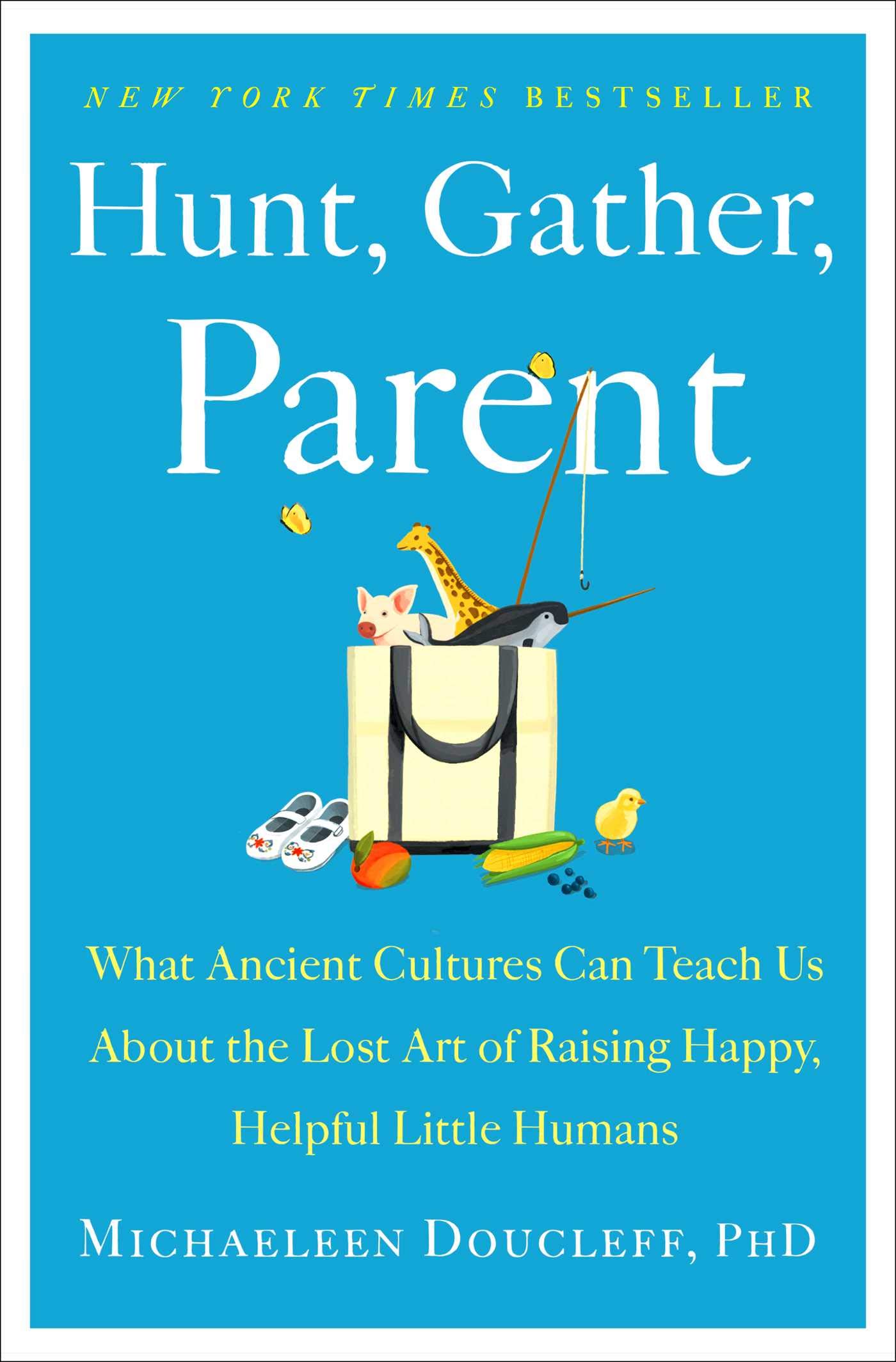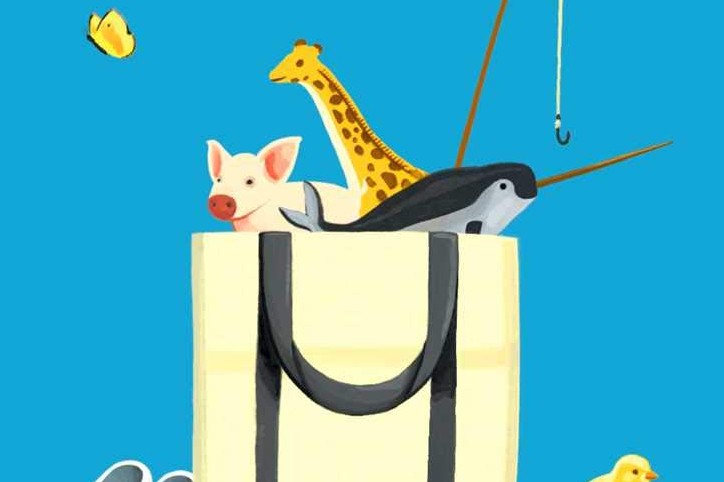Hunt, Gather, Parent, a new book by Michaeleen Doucleff, is one of the most interesting parenting books I’ve read lately. While much of the advice won’t be too shocking to anyone who follows the likes of Dr. Becky on the regular, there are plenty of nuggets that can easily be applied to every day life to help deal with every day parenting woes, chiefly – tantrums. I love that this book is both carefully researched and practical, while being an “easy read.”
I caught up with Doucleff, an NPR science correspondent, to chat about her new book and how parents everywhere can implement what she’s learned.
Momtastic: What inspired you to write this book?
Michaeleen Doucleff: When my little girl, Rosy, was 3 years old, she began to have terrible tantrums. My husband and I didn’t know at all how to handle them. Everything we did seemed to make them worse. We felt hopeless. Rosy and I were becoming enemies. I even dread my time with her.
At the same time, I was traveling for my job at NPR. I went to a tiny Maya village in the Yucatan and several Inuit communities in the Arctic. I was meeting moms and dads who totally changed my view of what parenting could be. There was no yelling, bickering, arguing. Not even negotiating. And the children were amazing. They were respectful, kind, generous and helpful – super, super helpful. I’m talking about kids who wake up in the morning during their spring break and immediately start washing the dishes – voluntarily!
I begin to realize that, in many cultures around the world, parents don’t struggle with the problems we have here. They easily raise helpful kids, who pitch in around the house voluntarily. They easily raise generous kids, who share with siblings voluntarily. And all that anxiety and stress we have with American kids – it’s unheard of in many communities.
I wanted to learn how they do this. And what we are doing wrong. So Rosy and I traveled to three communities around the world. Hunt, Gather, Parent is really all about what these amazing parents taught me about raising a kind, helpful, confident kid.
And here’s the kicker: the tips work incredibly well for our family — a busy, urban family that had no time for ineffective tools and tips. Every time I tried a new tool with Rosy, it worked way better than I expected. So I wrote Hunt, Gather, Parent to bring these tips to American families. Because I know they will help so much.

Momtastic: What was the most surprising discovery you made in your research?
Michaeleen Doucleff: How powerful storytelling is for disciplining kids. I’m talking about oral stories used to teach children how to behave and to keep them safe. These types of stories are found in every culture around the world. And they work like magic. Without this tool, American moms and dads are parenting with one hand behind their back.
At first I thought these stories were too scary for Rosy. For instance, in the Arctic, parents tell kids about a monster that lives in the water. And if the kids go too close to the water, the monster will rise up, grab them, and take them down to the bottom of the ocean. And they’ll never see their parents again. Yikes! Sounds scary.
But then one day, I couldn’t get Rosy to close the refrigerator door. I was trying my usually combination of adult logic (“Rosy, we’re wasting electricity.”) and then nagging (“Come on, Rosy. Please.”). Then I thought of the water monster. I said, “Rosy, there’s a monster in the refrigerator and if he warms up too much he will come and get you.”
She looked at me with wide eyes, slammed the door shut, and said, “Mommy tell me more about the monster.”
Ever since then, we have had the most wonderful monsters and stories in our home, from a sharing monster that lives up in a tree to the shoe monster who lives in the heating duct and will come get you if you don’t put your shoes on quickly in the morning. Rosy loves these stories. They’ve enhanced communication between us but also turned discipline into fun.

Momtastic: How has your parenting changed as a result of what you learned?
Michaeleen Doucleff: Oh my gosh, my parenting has changed in almost every way. But the biggest changes involve talking and activities. I talk way, way less to Rosy. And watch, way, way more. I used to talk all the time, telling Rosy what I’m doing and telling Rosy what to do. I once measured how many commands or instructions I was giving Rosy per hour and it was over 100. I was a bossy pants.
This bossiness was generating conflict between and taking away Rosy’s autonomy (which, in turn, was generating anxiety and stress inside her).
But the truth is, in the vast majority of cultures around the world, parents don’t do this! Not at all. They don’t boss kids around like we do in the U.S. While in Tanzania, I measured how many commands parents give kids. Guess how many? Two to three per hour.
So I started doing the same – two to three commands per hour. I watch Rosy and give her a verbal command or directions only when really needed. This shift has improved our relationship so much. It’s lessened conflict but also boosted Rosy’s confidence and self-sufficiency.
Another big change has to do with special kids’ activities, such as birthday parties, museums, zoos, and play dates. In the vast majority of cultures, parents don’t have all these so-called child-centered activities. And to be honest, kids don’t need them at all. They can make a child’s behavior worse and erode a child’s motivation to be helpful. They also take up time that could be spent teaching children to be helpful members of the family (not to mention, I just don’t enjoy them at all).
So I completely stopped doing them. I totally cut them out of our lives cold-turkey. And it has destressed our lives so much, given us more time to do chores and errands together and improved Rosy’s behavior enormously. Everyone in our family is calmer and more connected. At the end of the day, how can a child learn to be mature and learn the skills they need to be an adult if they spend all their time separated from the adult world.
Momtastic: What are some of the most common “mistakes” you see parents making based on your experiences researching this book and what would you suggest?
Michaeleen Doucleff: The no. 1 mistake is that parents argue and negotiate with kids. I suggest simply walking away from any arising conflict. When you argue with a child you not only lose all your power with them, studies have found, but you are simply teaching the child to argue. And so when I feel a power struggle or argument brewing, I touch Rosy lightly on the shoulder and walk away. If I really need something changed, I change it myself or help Rosy change it. That is, I take action.
Another BIG mistake: interfering way too much in children’s activities and actions. If you let children simply be they will surprise you. They figure out way more by simply being around you and watching you.
For example, if a child wants to bake a cake. Let them go do it! Don’t undermine their idea and desire by jumping in and telling them everything about how YOU would bake the cake. Or turn the whole task into a math lesson on fractions (ie., “How many ¼ cups are in one cup?”).
Momtastic: What have you learned about dealing with tantrums that you think every parent should know?
Michaeleen Doucleff: Tantrums are all about energy. The child’s energy level is way, way too high. If you talk to them, you only increase it. But if you bring your own energy down — way, way, way down — your child will find that same response in themselves. And over time, they learn to settle themselves. (For Rosy, it took about a month or so after I started using this approach. It was incredibly fast.)
Children’s energy and emotions mirror ours. So if they are upset, you have to find inside yourself, the calmness state ever. I’m talking about the way you feel after an hour-long massage. Slow movements. Soft face. Low, low energy. Think Mr. Rogers stones.
Then you simply go to the child, perhaps touch them on the shoulder, and then stand there in that calm state. I guarantee they will calm down. You might have to wait for a few minutes. But they will do it. I’ve seen it over and over again while traveling. And again with Rosy.
Right after I began using this approach, Rosy’s tantrums went from one or two a day to one or two a week. Then after several months, they went away altogether. It was a remarkable shift.








